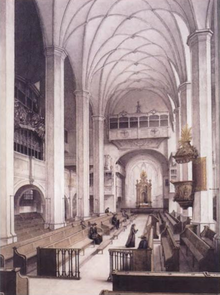Du wahrer Gott und Davids Sohn, BWV 23
| Du wahrer Gott und Davids Sohn | |
|---|---|
| BWV 23 | |
| Church cantata by J. S. Bach | |

Thomaskirche Leipzig, the location of the first performance, 1885
|
|
| Related | performed with BWV 22 |
| Occasion | Quinquagesima |
| Composed | 1723?: Köthen |
| Performed | 7 February 1723 and 20 February 1724, Leipzig |
| Movements | 4 |
| Chorale | "Christe, du Lamm Gottes" |
| Vocal | |
| Instrumental |
|
Du wahrer Gott und Davids Sohn (You true God and Son of David),BWV 23, is a church cantata by Johann Sebastian Bach. He composed it in Köthen between 1717 and 1723 for Quinquagesima Sunday and performed it as an audition piece for the position of Thomaskantor in Leipzig on 7 February 1723. The Sunday was the last occasion for music at church before the quiet time of Lent.
Bach had at least the first three movements ready for the audition in Leipzig and may have added the substantial last movement, derived from the lost Weimarer Passion, rather late. The cantata deals with healing the blind near Jericho. An anonymous author stayed close to the gospel, having the blind man call Jesus in the first movement, and begging Jesus not to pass in the second. In the last movement Bach presents an extended version of "Christe, du Lamm Gottes", the German Agnus Dei of the Lutheran mass. He scored the cantata for three vocal soloists, a four-part choir, and a Baroque instrumental ensemble with oboes, strings and continuo.
Bach possibly led the audition performance of the work in Leipzig in the Thomaskirche on 7 February 1723, probably after the sermon. He performed the cantata again for the same occasion on 20 February 1724, this time reinforcing the voices by a brass choir in the final movement.
Bach probably composed the cantata in Köthen between 1717 and 1723 for Quinquagesima Sunday, the last Sunday before Lent, also known as Estomihi. He revised it, transposing it from C minor to B minor and possibly adding the last movement, to be a test piece, together with Jesus nahm zu sich die Zwölfe, BWV 22, for his application for the position of Thomaskantor, director of church music in Leipzig. The prescribed readings for the Sunday were taken from the First Epistle to the Corinthians, "praise of love" (), and from the Gospel of Luke, healing the blind near Jericho (). The authorship of the poetry is unknown. The Sunday was meaningful because it was the last chance to perform cantata music before the quiet time of Lent began.
...
Wikipedia
